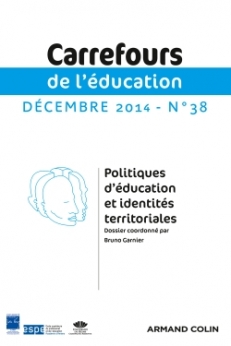
Carrefours de l'éducation n° 38 (2/2014)
Pour acheter ce numéro, contactez-nous
Recevez les numéros de l'année en cours et accédez à l'intégralité des articles en ligne.
Ecole et sentiment identitaire en Corse, sous la IIIe République La Corse, sous la IIIe République et même avant, a pleinement joué le jeu de l’intégration à l’ensemble national. Pour autant, elle n’en a pas, dans le même temps, renoncé à y signifier sa singularité. Cela se manifeste particulièrement dans la façon dont, historiquement, question linguistique et question politiques sont indissolublement liées. Cet article examine les contradictions dont l’installation du paradigme républicain fait l’objet au sein du système éducatif, avant et après la première guerre mondiale en Corse. Sur un plan général, est posée la question des visions de l’école à travers la question de l’imposition du français vue par deux auteurs ayant vécu cette époque, Mathieu Ceccaldi et Antoniu Trojani. Sur un plan plus spécifique, est abordée la question de l’enseignement de l’histoire, à laquelle on peut annexer celui de la géographie.Il s’agit d’examiner comment les auteurs locaux, encouragés qu’ils sont à promouvoir l’enseignement des petites patries, concilient aspirations identitaires et exigences républicaines, parfois au prix de contorsions assez confondantes vis-à-vis de la réalité des faits.
Corsica under the Third Republic and before was completely given over to national integration. It nonetheless did not give up on the project of expressing its singularity within the nation. This shows itself in particular in the way that, historically, linguistic issues and political issues are inseparably linked. This paper examines the contradictions that the establishment of the republican paradigm within the school system lead to in Corsica before and after the First World War. From a general point of view, the issue of the educational vision carried by the schools is questioned through the issue of the imposition of French with a reading of the testimony of two authors who lived through this period, Mathieu Ceccaldi and Antoniu Trojani. More specifically, the issue of the teaching of history, and that of geography, is treated. The point is to analyse how local authors, encouraged as they are to promote the values and ideals of “petites patries” (regional countries), conciliate aspirations to identity and republicandemands, at times at the cost of rather surprising distortions of fact.